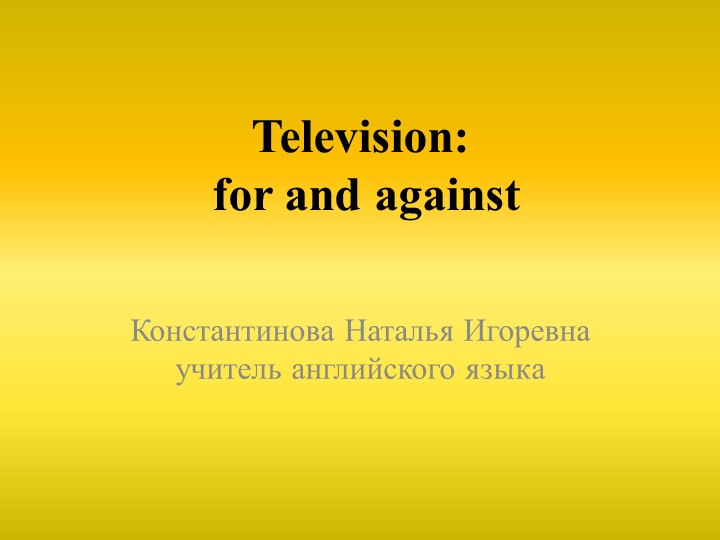Реклама – за и против

- Рубрика: Презентации по английскому языку
- Просмотров: 594
Презентация "Реклама – за и против" онлайн бесплатно на портале электронных презентаций school-present.com
Презентация урока по английскому языку в 9 классе Тема « Реклама – за и против » Андреева Светлана Викторовна Учитель английского языка ГБОУ СОШ № 378
Комбинированный урок с видеоподдержкой, с применением технологии критического мышления. Цели: социокультурный аспект – знакомство с мнениями британских и российских подростков о роли рекламы в их жизни; развивающий аспект – развитие критического мышления через изучение информации, постановку вопросов и выделение проблем, которые необходимо решить; развитие способности к самостоятельности, к переключению внимания в различных видах речевой деятельности, к планированию своего высказывания; развитие умения сотрудничать и работать в группе; развитие творческих способностей; воспитательный аспект - формирование потребности и способности к пониманию чужой точки зрения на проблемы, связанные с влиянием рекламы на жизнь подростков, воспитание уважительного отношения к собеседнику и его взглядам; учебный аспект – совершенствование речевых навыков по теме «Реклама»; развитие умений читать и аудировать с целью полного понимания текстов. Речевой материал – речевой материал цикла 3. Средства – цитаты о рекламе, компьютер, экран, проектор, видеофрагменты с рекламными роликами, диск с записью текстов и музыки к уроку, тексты для чтения, детские презентации своих собственных рекламных роликов.
Ход урока I The beginning of the lesson. Greeting the class. The teacher’s introduction to the lesson. The theme and the aims of the lesson. Hello, my dear boys and girls. Glad to see you. Today we have guests at the lesson. That’s why you have an excellent chance to show how you know English. We are going to work individually and in groups. (Звучит музыка из знакомых рекламных роликов). - Do you recognize these tunes? - You are right. This is advertisement. Look at the screen. You can see some quotes. Read them and think of what they are about and what the subject of our lesson is. “The best advertisement is a good product” Alan H. Meyer. American advertising executive “Advertisement is the mover of the trade” folk wisdom “Advertising is the tool of the seller that help him to affect you and make buy his goods”, “Any advertisement won’t help to sell the thing that is impossible to sell” (from the Parkinson’s laws) - Well, you are right. Today we are going to discuss the problems of advertisement, its advantages and disadvantages. Is it annoying factor for you, may be, you like it very much? You’ll have an opportunity to use your lexical and grammatical knowledge in new situation. To my opinion the proverb that you can see on the screen “All is not gold that glitters” suits our lesson quite well. Now try to translate it. Do you know any Russian proverb which has the same meaning? And I want you to prove it at the end of the lesson. II. Warming up. Speaking. We are going to get some knowledge, which helps you express your opinion about advertisement. But first answer my questions, please. - What do you usually do, when they show a commercial: do you switch off TV or change the channel or watch it? - Do commercials irritate you?
- Do you like any ads? Do you have a favourite ad? - Do you buy something new that has been advertised? III. Group work. Speaking. You have already divided into two groups. The first group will protect ads. The participants of the second group are their opponents. Their task is to give bad points of advertising. Good luck! Good points: give true information, famous people endorse products, teach you how to get the best value for your money, truthful, help you choose best products, help to improve your taste, are creative, informative, clever, funny, full of humour, fantasy, present an honest, realistic image of a product, people seem to be happy consumers. Bad points: do not talk about the products’ defects, make you buy one thing instead of another, are misleading, show life unrealistically, put pressure on consumers, are impossible to check, are silly, annoying, convince people to buy things they don’t need. IV. Reading. / Listening (Reading / Listening for detail) Here are four British teenagers’ views on advertising. (Two texts are for reading and two texts are for listening) Read and listen to the viewpoints and say what bad and good points British teenagers see in advertising. For reading: The best thing on TV is the adverts. Some of them are wonderful – really funny. to be honest, I like them more than the programmes. Why have programmes if we have adverts? Watching commercials for me is like watching a thrilling television serial. It’s great! Commercials are creative and informative. Watch, they are full of fun, humour and fantasy! Best of all I enjoy ads that show a TV celebrity advertising a thing, a product or a service. Everything a famous TV personality recommends is worth buying, isn’t it? Rose (15), Wales According to the latest research, adverts aimed at children are not working. Why? Because lots of children like adverts that sell things that only adults can buy like cars or expensive mobile telephones. Most of these advertisements are rather informative
and of good quality. But sometimes they sell stuff that nobody needs and some are played so often that you start hating them. Sue (14), England For listening: Watching a film on television is really like watching twenty commercials with a film sandwiched in between. Some ads are really clever or make you laugh. But some ads are so annoying and when there is a commercial break, that’s the time for me to rush to the refrigerator. I prepare a snack and come back just in time for the start of the film. You don’t love all the ads, either? Go and get some food! Ted Ads are annoying! Around 15 minutes in every hour of TV are full of ads. The most annoying thing about adverts is that they come on when you are watching a really good film, they really spoil it! Besides, in adverts kids seem to always be healthy, happy and well-off. All the women seem to be young and beautiful. All the men seem to love their household chores. All the teenagers seem to have a wonderful time at parties and at school. and all of them seem to enjoy large family gathering. But that’s not true at all! Phil V. Speaking. And what do you think of advertising anyway? a) I don’t take advertising seriously! On the one hand … But on the other hand … When I … Besides, in adverts … What’s more … b) Advertisements are misleading! They … More than that .. They also … In brief ..
c) The best thing on TV is the adverts. Watching commercials for me is like … Commercials … They … Best of all … Besides, … VI. Video. / Speaking. Now, watch some ads and say, what you think about them. Express your attitude toward these ads. VII. Checking hometask. / Project work. / Speaking. Each group had a task to create a project “My advertisement” and present it. (Участники первой группы, просмотрев рекламный ролик второй группы, выражают свое отношение к нему и наоборот) VIII. Group work. Speaking. Now I want you to work in groups again. Try to prove that the proverb “All is not gold that glitters” suits our lesson. You are given three minutes. IX. Conclusion. Dear pupils! I’d like to thank you for your work. You were really great! You have worked hard and have come to different conclusions about ads. But I think advertising is a part of our life. We must admit the fact that sometimes ads help to choose something. Now I want you to draw up your feelings and impression. What do you think of our lesson? (Учащиеся с помощью символических значков рисуют «впечатления» об уроке.
Источники информации О.В. Захарьина. Английский язык. 4-11кл.Современные образовательные технологии. «Учитель»- 2009 http://www.zaycev.net/ http://vk.com/ http://best-mp3.ru/ http://www.youtube.com/ http://rutube.ru/ http://www.dailymotion.com/ru В.П. Кузовлев. Книга для учителя. «Просвещение» - 2010













